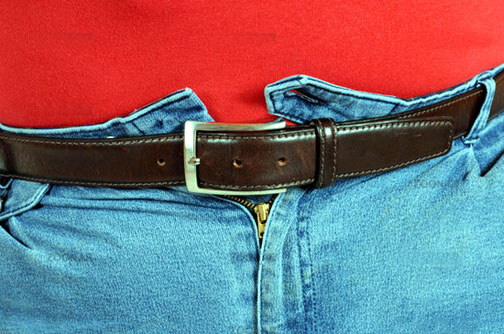Tags
Fat people catch a lot of flak, though possibly not more than what could be good for them. While obesity rates across the world continue to climb, the politically correct demand the we celebrate everyone’s body size equally, regardless of how large they are, and that we no longer make fun of those whose bulk can form a line of its own. While polite society is busy giving permission for the corpulent to get even more fat, we are also supposed to rethink the myths once associated with the obese, such as that they are stupid, lazy, stink, and are slobs. But are these once universally held truths about fatties just uninformed prejudices from days gone by? Is being a plus size really not a minus? Or did Walt Disney know what he was doing when he named his elephant Dumbo?
Yup, smells like science to me. Though in your case it might smell more like chocolate cake floating in a half gallon of Coconut Macaroon Häagen-Dazs with a cherry on top.
According to recent studies by several different researchers across the globe, at least one of the myths about people whose part time job is going to the beach to sell their shade, has a basis in science. These independently conducted studies all agreed on one thing: if you need a bar stool for each of your butt cheeks you are four times more likely to get dumber as you age. Research has shown people with big stomachs tend to have smaller brains before the age 50 years and are at an increased the risk of suffering Alzheimer’s and other forms of the dementia disease in their golden years. That fat people are lazy, smell, and are slobs is still debatable. But the belief that those whose blood type is rocky road are stupid, at least as they age, is now backed up by science.
If when dining out you get an estimate instead of a menu, memory problems may be in your future according to a study at the University of California, Davis. But that can be to your favor; you can then act like you didn’t know you’d already had dessert. Researchers there working under the direction of Charles DeCarli, M.D. ran more than 1,300 middle-aged men and women through a series of memory and thinking tests, then had them do the tests again a decade later. People who were obese during the first exam were 39% more likely to score in the bottom quarter of mental test scores. And according to MRI scans conducted on the participants, people who carried a lot of fat around their middle saw their brains physically shrink in size.
So if when you step on a scale and it says “To be continued,” it’s not just your little head that is shrinking as your stomach expands, your big head is getting smaller too. “Obesity, diabetes, and high blood pressure all cause damage to blood vessels throughout the body, including the ones that feed brain cells,” explains DeCarli. “Loss of brain size causes widespread reductions in thinking abilities, as if your brain was aging more rapidly.”
Dr. Dae Hyun Yoon, associate professor of psychiatry at Seoul National University Hospital concurs. His research found an association between high levels of belly fat and poor cognitive function in older adults. He examined 250 adults over the age of 59, with each participant undergoing body fat composition measurements, abdominal CT scans, and cognitive testing. His research concluded that adults between the ages of 60 and 70 who when their beeper goes off people think they are backing up are more likely to have decreased mental performance.
Weili Xu of the Karolinska Institute in Stockholm also contributed to the expanding body of evidence supporting the belief that expanding bodies in middle age increases the risk of dementia later on. His study, published in the Journal of Neurology, examined data on more than 8,500 people over the age of 65 using records of the participants’ height and weight in the decades before and found that those who had been overweight in middle age had an 80% higher risk of being diagnosed with dementia in later life. But for those who had already obtained obese status in their 40s and 50s, the risk soared. People in mid-life with more chins than a Hong Kong phone book had an almost four times higher risk of mental deficiencies in their golden years.
Belly fat is recognized as the most dangerous type of fat; extra fat that is packed around organs in the abdomen release more acids which in turn increases the risk of heart disease, along with an increase in blood pressure and blood sugar levels. Other studies have previously linked obesity to diseases of the blood which play a role in dementia, in part through the hardening of the arteries. As a rough guide, doctors now recommend that men should sport a stomach no bigger than 40 inches or 100 cm.
If you are 60 years of age or older and your favorite position is doggy style but your boy du jour calls it riding piggy back, Sudha Seshadri of the Boston University School of Medicine says the university’s research shows your brain is smaller than those whose stomach yours eclipses. And that the fatter you get, the tinier your brain becomes. Conducting a study that included brain volume scans of 733 men whose average age was 60, the researchers found a strong correlation between both central obesity and a heightened risk of dementia and Alzheimer’s disease, and the amount of stomach fat and increased brain atrophy. On the plus side for those who are plus sized, science now shows that as they age they will not remember just how fat they really are.
Related Posts You Might Enjoy:







It’s Not Just That You’re Fat
but you also run a gaythai message board ….
amazing how these things always come in twos … psst .. wanna buy a wheelchair ??? which reminds me of the time a guy in a wheelchair asked me to fuck him … i let his tyres down 🙁
ROFL
(and I never drew the line connecting obseity and board ownership. Just for the record. Yet.)